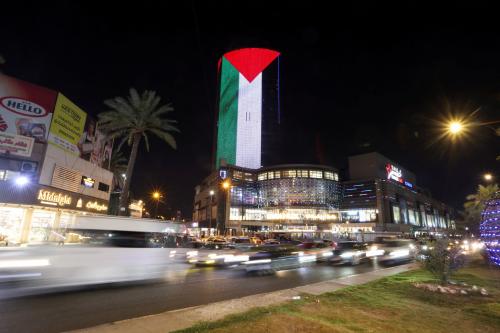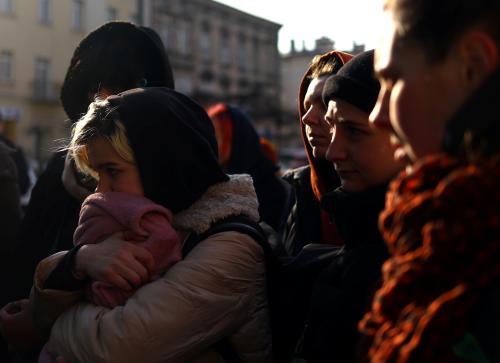HARRY SMITH, co-host: As the Iraq war rages on, many Americans are wondering if US troops are going to be coming home in 2006. The Bush administration won’t commit to a timetable, though the Pentagon has said it hopes to start bringing home troops home soon. Michael O’Hanlon is a foreign policy analyst at the Brookings Institution. He joins us this morning.
Good to see you, Michael. Good morning.
Mr. MICHAEL O’HANLON (Brookings Institution): Good morning, Harry.
H. SMITH: We just watched this piece with Kelly Cobiella. There had been this lull, this sort of seeming cessation of violence during the election period there for a while. The violence is back again. There are lines at gas stations because the price of gas has gone up in Iraq. It seems a little bit like `business as usual’ has returned there. What—what do you make of things?
Mr. O’HANLON: Well, I think you’re right. Although, the fact that gas prices are up is actually good news. They’ve been subsidize at the rate of, I think, 20 cents a gallon being the cost or so, which is totally a drain on the Iraqi budget. So some of these things have to happen, and that’s just one of the stories that we have to keep in mind. They’re going to be some difficult transitions, sometimes for good reason. But I’m more troubled by the fact that the Sunni Arabs who voted, as you know, in large numbers a couple of weeks ago seem now to be very unhappy with the election, believing they were fraudulent, calling for a rerun of the election. That’s a bad sign because we need the elections to lead to a Sunni Arab buy-in for the whole political process, and if that doesn’t happen then the longer term prognosis is not very good.
H. SMITH: Because the whole thing, the whole purpose of this parliamentary election, they have this free election, people have—are encouraged to participate in this democracy. Can they form a government was the question we were asking a couple of weeks ago. Can you see any sign that this is actually going to take place.
Mr. O’HANLON: Yes, I think there will be a government. The question is will it seem to involve enough of the Iraqi groups that those who are not big players still support and do not support more fighting. The Sunni Arabs may not wind up part of this government. As you know, the Kurds and the Shias together have about four-fifths of Iraq’s population, and they’ll have about four-fifths of Iraq’s members of parliament. And they could essentially trod over the Sunni Arabs if they so choose. And even if they don’t, the Sunni Arabs may decide that’s what’s happened and just decide to increase the support for the insurgency. So we have a moment of political opportunity here. Overall, it’s still been a pretty good last two weeks…
H. SMITH: Mm-hmm.
Mr. O’HANLON: …but there’s no guarantee this is going to lead to a long-term Sunni Arab support for the politics of Iraq. It could, again, lead to more support for the insurgency.
H. SMITH: You mean, because the insurgency, of course, is divided between the outsiders that have come in to fight against the American forces and the old Baathists who are tied to Saddam Hussein.
Let’s move on to troop levels. We hear from Secre—former Secretary of State Colin Powell that maybe the reason troop levels are going to come down is because, quite frankly, they’re just not sustainable at the level they are right now. About 108—138,000 troops over there. What—what is your sense? Are we going to see some drawdown of US troops in 2006?
Mr. O’HANLON: Yes, but I think the main reason is, frankly, that we have to in the sense that we are not all that welcome in Iraq. It’s a strange sort of paradox. We’re necessary, and many Iraqis know we’re necessary. In fact, the majority do not want us to withdraw entirely tomorrow, but they also somehow resent our presence. It’s a very contradictory set of sentiments. But unfortunately, to the extent we stay there with big forces indefinitely, Iraqis will come up with all these theories that we really want to stay there for their oil. We want to use their country as a springboard for more aggression. They still see us as occupiers even though we’re really not. And therefore we have to come up with this strategy, as the Bush administration has rightly done, of downsizing as quickly as possible. So I think Secretary Powell is right; the military is feeling a lot of stress. But the core reason here why we’re going to downsize is because Iraqi security forces are now more capable, and we have to downsize to–to lower this perception that we are occupying a country.
H. SMITH: And help legitimize the Iraqi government, whatever it turns out to be.
Mr. O’HANLON: Exactly. Right.
H. SMITH: Michael O’Hanlon, as always, we do appreciate it, sir. Happy new year to you.
Mr. O’HANLON: Likewise.
H. SMITH: You bet.
Now here’s Tracy.
TRACY SMITH, co-host: Thanks, Harry.



Commentary
Current Situation in Iraq
December 27, 2005